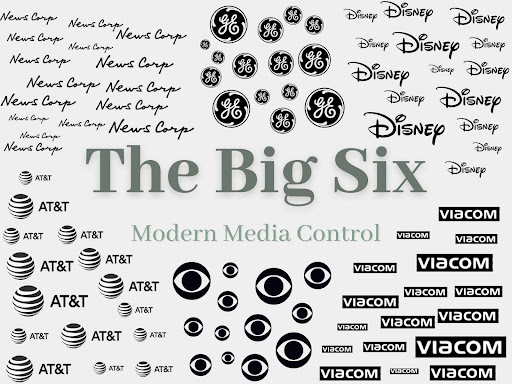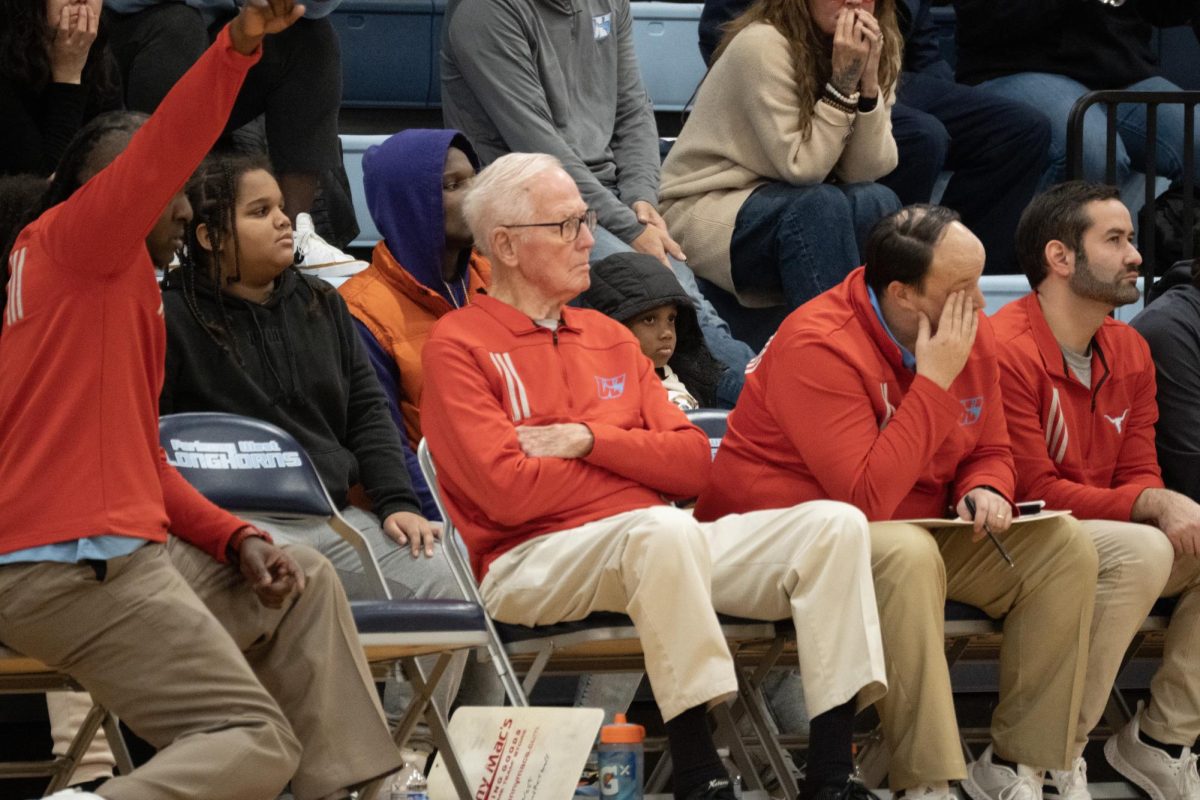
Just 37 years ago, there were 50 companies in charge of most American media. Now, 90% of the media in the United States is controlled by just six corporations: AT&T, CBS, Comcast, Disney, Newscorp and Viacom. This means that just 232 media executives are calling the shots for the vast majority of the information we are presented with, controlling a total Big Six net worth of over $430 billion.
It’s been no secret that Big Tech companies — the nickname for the enormous corporations like Facebook or Google — have come under fire recently for their controlling practices. While Facebook and other media giants sought to combat extremism and political misinformation on their platforms, specifically in light of the 2020 presidential election, Bill Baer and Caitlin Chin of Brookings remind us that this only demonstrated the power that social media giants hold over what we consume.
But even more than that, past the small screen of social media, the other forms of information, arguments and entertainment we consume are still being controlled by a very small amount of Facebook-type corporations. At an individual level, this may not appear to affect what’s presented in the news. Personally, I sometimes have a hard time seeing why a vague, distant-seeming corporation like Comcast would impact the traditionally reliable reporting of a single journalist at NBC News. At West, two-thirds of 63 students polled said they get most of their news from national organizations.
The idea is that when six corporations, whose primary motivations are to ultimately profit as much as possible, are in charge of what we consume, the narratives do not challenge the status quo in the ways that could inspire large-scale change. I’m not saying a New York Times article can’t be plenty critical of the government or of the many social ills plaguing this country. As a whole when reporting begins to fulfill the needs of a multi-million or billion-dollar corporation, it seeks to benefit this corporation, no matter the cost.
What benefits a news corporation? In the past, newspapers relied on subscriptions or individual sales. Likewise, radio or television programs rely on advertisement sales. While the medium has changed, the sentiment stays the same. News companies need ad sales or subscriptions to make money and to secure these, they need popular content. Entertainment companies, which NBC, CBS, Fox and others also operate as such, are no different.

While this may benefit the company, it inherently stifles dissent. To a corporation, challenging opinions that may not be as popular as mainstream views do not serve to generate profit and thus are not worthwhile. Though a publication may rarely operate in such a sinister manner, this underlying thought of what makes readable content in any form is pervasive, suppressing creativity. It’s journalism in the age of capitalism, and if it can’t make money, it’s not worth approving. As Jack Schafer writes in Politico — which is run by an enormous, capitalist-loving German corporation — “For much of America’s history, news entrepreneurs entered the market expecting to make money.”
Many privately-run newspapers are losing money as local publications continue to bite the dust, losing more and more readership to the Big Six. Only six students surveyed said they found most of their news from a local source. Some are trying to escape the world of for-profit journalism. The Chicago Sun-Times announced its merger with the local NPR non-profit affiliate in January. But in a world where you still have to be incredibly rich to run a newspaper, this switch means little.
Even if it’s a local source, the Big Six is still influencing what you read by stealing their markets and forcing them to adapt. As Schafer puts it, “The rich always say they’ll never try to influence the nonprofit journalism they fund, but that’s laughable. Like for-profit operators, they want to see the news reported in their image.”
For-profit or non-profit local news, are still being run by the rich for the rich. Even media giant Lee Enterprises owns our beloved Post-Dispatch, one of 77 daily newspapers under their ownership.
If you’re now feeling lost about where to turn for your news or entertainment, you’re not alone. Corporate instability unfairly impacts the type of media we have access to, and the type of media has access to us. While we must keep pursuing different avenues of journalism that strive to overcome corporate dominance, we can’t forget to push back against that corporate dominance in the first place. This dominance is supported by the U.S. government as well. Just look to the big banks that received government funding over ordinary citizens back in 2008 or the corporations that were first in line for bailouts at the beginning of the pandemic.
Journalism in America and around the world is not separate from corporate takeover and influences our lives every day. Yet, everywhere we turn for independent journalism, a corporation lurks behind smoke and mirrors. It’s easy to turn to the companies we know and trust to give us the news we need. Nevertheless, it’s important to consume a variety of information, and some of that must include media that hasn’t been produced by a money-hungry corporation.
This, on its own, won’t solve the problem, though. As citizens of the U.S., we must challenge subjection and protest corporatism. Contacting elected officials or writing to those corporations themselves can only do so much when they will do anything to stay in power and keep profiting off of us. We must use direct action, including protests, to rid ourselves of corporate control. Only when we are free can we truly appreciate media that does not seek to pad a bank account but instead is created to inform and entertain regardless of its monetary value.



![Junior Fiona Dye lifts weights in Strength and Conditioning. Now that the Trump administration has instituted policies such as AI deregulation, tariffs and university funding freezes, women may have to work twice as hard to get half as far. "[Trump] wants America to be more divided; he wants to inspire hatred in people,” feminist club member and junior Clara Lazarini said.](https://pwestpathfinder.com/wp-content/uploads/2025/05/Flag.png)
![As the Trump administration cracks down on immigration, it scapegoats many immigrants for the United States’ plights, precipitating a possible genocide. Sophomore Annabella Whiteley moved from the United Kingdom when she was eight. “It’s pretty scary because I’m on a visa. When my visa expires next year, I’m not sure what’s going to happen, especially with [immigration] policies up in the air, so it is a concern for my family,” Whiteley said.](https://pwestpathfinder.com/wp-content/uploads/2025/05/DSC_0077-7copy.jpg)
![Shifting global trade, President Donald Trump’s tariffs are raising concerns about economic stability for the U.S. and other countries alike. “[The tariffs are] going to pose a distinct challenge to the U.S. economy and a challenge to the global economy on the whole because it's going to greatly upset who trades with who and where resources and products are going to come from,” social studies teacher Melvin Trotier said.](https://pwestpathfinder.com/wp-content/uploads/2025/05/MDB_3456-1200x800.jpg)



![Some of the most deadly instances of gun violence have occurred in schools, communities and other ‘safe spaces’ for students. These uncontrolled settings give way to the need for gun regulation, including background and mental health checks. “Gun control comes about with more laws, but there are a lot of guns out there that people could obtain illegally. What is a solution that would get the illegal guns off the street? We have yet to find [one],” social studies teacher Nancy Sachtlaben said.](https://pwestpathfinder.com/wp-content/uploads/2025/01/DSC_5122-1200x800.jpg)


![Making up a large portion of the film industry, many popular movie remakes and sequels have been released recently. Similar to film remakes, theater teacher Amie Gosset often uses play adaptations of famous movies for theater productions. “It’s challenging because people have an idea of what the film is, whether it’s an iconic film or one they really liked. [Consumers] come in with a preconceived notion of how the [film] should be. Then, [they] are either surprised because they like the new version or disappointed because it’s not what they’re used to.”](https://pwestpathfinder.com/wp-content/uploads/2024/12/DSC_0042-1200x801.jpg)


![Pitching the ball on Apr. 14, senior Henry Wild and his team play against Belleville East. Wild was named scholar athlete of the year by St. Louis Post-Dispatch after maintaining a high cumulative GPA and staying involved with athletics for all of high school. “It’s an amazing honor. I feel very blessed to have the opportunity to represent my school [and] what [it] stands for,” Wild said.](https://pwestpathfinder.com/wp-content/uploads/2025/05/unnamed-6-1200x714.jpg)
![Red, white and blue, the American flag holds the values of our democracy. The fight that we once endured has returned, as student journalists and senior correspondents across the country are losing their voices due to government control. “[Are] the White House and [the] government limiting free speech [and] freedom of the press? Yes [they are],” chief communications officer of the Parkway School District and former journalist Elisa Tomich said.](https://pwestpathfinder.com/wp-content/uploads/2025/03/Untitled-design-14.jpg)
![Freezing in their position, the Addams Family cast hits the “rigor mortis” pose after cast member and senior Jack Mullen, in character as Gomez Addams, calls out the stiff death move. For the past four months, the combined company of cast members, orchestra pit, crew and directors all worked to create the familial chemistry of the show. “I’m excited for [the audience] to see the numbers, the music, the scenes, but I also just love all the technical aspects of it. The whole spectacle, the costumes, makeup and the people that put in the work backstage in order to make the show successful on stage. I’m excited for people to see and appreciate that,” Mullen said.](https://pwestpathfinder.com/wp-content/uploads/2025/03/DSC0116-1200x800.jpg)
![A board in the Parkway West counseling department displays pennants of selective universities. With a wide range of students interested in attending, it’s important that these schools have clear priorities when deciding who to admit. “[Washington University] had the major that I wanted, psychology, philosophy, neuroscience. That's a holistic study of the brain, and [WashU is] the only college in the world that offers that. That's the main reason I wanted to go; I got into that program,” senior Dima Layth said.](https://pwestpathfinder.com/wp-content/uploads/2025/02/Flag-1.png)

![Within the U.S., the busiest shopping period of the year is Cyber Week, the time from Thanksgiving through Black Friday and Cyber Monday. This year, shoppers spent $13.3 billion on Cyber Monday, which is a 7.3% year-over-year increase from 2023. “When I was younger, I would always be out with my mom getting Christmas gifts or just shopping in general. Now, as she has gotten older, I've noticed [that almost] every day, I'll open the front door and there's three packages that my mom has ordered. Part of that is she just doesn't always have the time to go to a store for 30 minutes to an hour, but the other part is when she gets bored, she has easy access to [shopping],” junior Grace Garetson said.](https://pwestpathfinder.com/wp-content/uploads/2024/12/DSC_0249.JPG-1200x801.jpg)
![Complex global supply chains supply the goods for everyday luxuries, such as the coffee at West High’s Blue Brew. Low tariffs enabled much of the prosperity of modern history. “Higher tariffs lead to higher costs. A tariff is a tax on an imported good, and someone has to pay for that tax, and typically that [will] end up impacting consumers,” economics teacher Rachel Money said.](https://pwestpathfinder.com/wp-content/uploads/2024/12/Flag-1.png)



Ryan • Feb 15, 2025 at 2:05 pm
Your very brave for writing this. I’ve always felt that if the media was overwhelmingly against an individual, that individual must threaten their money and power and therefore must be doing the right thing by the average “joe”. Think about that for a minute, and apply it to today’s headlines…. yeah, maybe not all is as it seems.
Shannon Connaire • Feb 4, 2025 at 10:30 am
I’ve been looking for an article to help me explain the control of the media and why it’s a problem to someone – so far this is the best I’ve found in content and approachable, while still poignant explanation. Thank you!
John Goff • Feb 23, 2024 at 11:30 am
General Electric does not own any of those companies anymore. They sold in 2009, this is not accurate for an article written in 2022.
R. Gina Renee • Feb 14, 2024 at 2:12 pm
Nice job, Ms. Nalbandian. I asked my AP gov students to read your editorial for our news media unit. (High school teacher in Overland Park, KS.
ROD • Jan 28, 2024 at 3:08 pm
Eye opening. The top 6 companies that control 90% of media are also HUGE political donors. They control all information, and can spin it any way. Since 2020, most information that’s unfavorable to Democrats goes unreported. Or things get reported with information omitted and key facts missing.
Vee • Feb 24, 2025 at 8:25 am
They vast majority are overwhelming conservative, so please use your own logic when you assumed they were liberal owners. Opensource.org
Charlene W • Sep 16, 2023 at 12:14 pm
The worlds a show, ladies and gentlemen we are the players!
Nora Tenorio • Mar 15, 2023 at 11:38 pm
whoah this weblog is magnificent i really like studying your posts. Keep up the good work! You recognize, lots of persons are looking around for this info, you could aid them greatly.
Nicolas • Dec 21, 2022 at 6:33 pm
Sources?
Serena Liu • Jan 9, 2023 at 11:24 am
They are linked
Will Gonsior • Dec 15, 2022 at 12:36 pm
Wonderful article. Only highlights the importance of being able to apply good philosophy and interpret events for yourself.
Zaven Nalbandian • May 9, 2022 at 3:04 pm
https://www.pbs.org/wgbh/pages/frontline/shows/cool/view/
Joren • Sep 4, 2024 at 2:07 pm
that’s 2014.